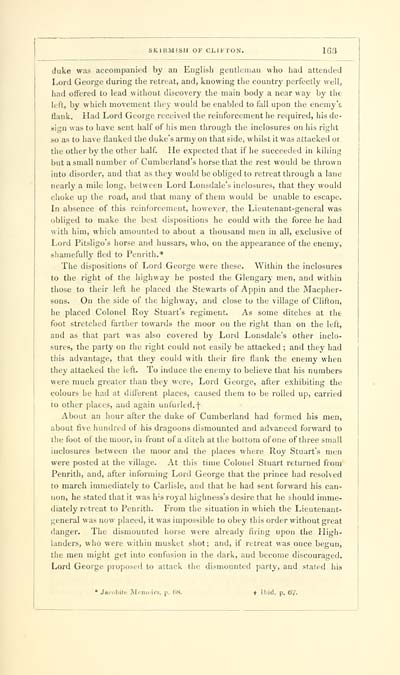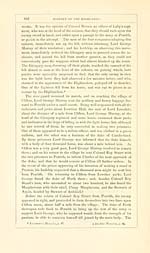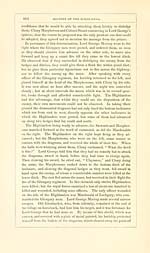Download files
Complete book:
Individual page:
Thumbnail gallery: Grid view | List view

SKIRMISH OF CLlhTON. 103
duke was accompanind by an English gentloniaii who had attended
Lord George during the retreat, and, knowing the country perfectly well,
liad offered to lead without discovery the main body a near way by tlit
h't't, by which movement tliiy would be enabled to fall upon the enemy's
dank. Had Lord George received the reinforcement he required, his de-
sign was to have sent half of his men through the inclosures on his right
so as to have flauked the duke's army on that side, whilst it was attacked or
the other by the other half. He expected that if he succeeded in killing
but a small number of Cumberland's horse that the rest would be thrown
into disorder, and that as they would be obliged to retreat through a lane
nearly a mile long, between Lord Lonsdale's inclosures, that they would
choke up the road, and that many of them w ould be unable to escape.
In absence of this reiuforcemeut, however, the Lieutenant-general was
obliged to make the best dispositions he could with the force he had
with him, which amounted to about a thousand men in all, exclusive of
Lord Pitsligo's horse and hussars, who, on the appearance of the enemy,
shamefully fled to Penrith.*
The dispositions of Lord George were these. Within the inclosures
to the right of the highway he posted the Glengary men, and within
those to their left he placed the Stewarts of Appin and the Macpher-
sons. On the side of the highway, and close to the village of Clifton,
he placed Colonel Roy Stuart's regiment. As some ditches at the
foot stretched fartlier towards the moor on the right than on the left,
and as that part was also covered by Lord Lonsdale's other inclo-
sures, the party on the right could not easily be attacked ; and they had
this advantage, that they could with their fire flank the enemy when
they attacked the left. To induce the enemy to believe that his numbers
were much greater than they were. Lord George, after exhibiting the
colours he had at dilferent places, caused them to be rolled up, carried
to other places, and again unfurled. -j-
About an hour after the duke of Cumberland had formed his men,
about five hundred of his dragoons dismounted and advanced forward to
the foot of the moor, in front of a ditch at the bottom of one of three small
inclosures between the moor and the places where Roy Stuart's men
were posted at the village. At this time Colonel Stuart returned from
Penrith, and, after informing Lord George that the prince had resolved
to march immediately to Carlisle, and that he had sent forward his can-
non, he stated that it was h-s royal highness's desire that he should imme-
diately retreat to Penrith. From the situation in which the Lieutenant-
general was now placed, it was impossible to obey this order without great
danger. The dismounted horse were already firing upon the High-
landers, who were within musket shot; and, if retreat was once begun,
the men might get into confusion in the dark, and become discouraged.
Lord George proposed to attack the dismounted party, and stated his
• JaiuLilu Wfiu.ii-s, (i. (is. f Ibid. p. 6'/.
duke was accompanind by an English gentloniaii who had attended
Lord George during the retreat, and, knowing the country perfectly well,
liad offered to lead without discovery the main body a near way by tlit
h't't, by which movement tliiy would be enabled to fall upon the enemy's
dank. Had Lord George received the reinforcement he required, his de-
sign was to have sent half of his men through the inclosures on his right
so as to have flauked the duke's army on that side, whilst it was attacked or
the other by the other half. He expected that if he succeeded in killing
but a small number of Cumberland's horse that the rest would be thrown
into disorder, and that as they would be obliged to retreat through a lane
nearly a mile long, between Lord Lonsdale's inclosures, that they would
choke up the road, and that many of them w ould be unable to escape.
In absence of this reiuforcemeut, however, the Lieutenant-general was
obliged to make the best dispositions he could with the force he had
with him, which amounted to about a thousand men in all, exclusive of
Lord Pitsligo's horse and hussars, who, on the appearance of the enemy,
shamefully fled to Penrith.*
The dispositions of Lord George were these. Within the inclosures
to the right of the highway he posted the Glengary men, and within
those to their left he placed the Stewarts of Appin and the Macpher-
sons. On the side of the highway, and close to the village of Clifton,
he placed Colonel Roy Stuart's regiment. As some ditches at the
foot stretched fartlier towards the moor on the right than on the left,
and as that part was also covered by Lord Lonsdale's other inclo-
sures, the party on the right could not easily be attacked ; and they had
this advantage, that they could with their fire flank the enemy when
they attacked the left. To induce the enemy to believe that his numbers
were much greater than they were. Lord George, after exhibiting the
colours he had at dilferent places, caused them to be rolled up, carried
to other places, and again unfurled. -j-
About an hour after the duke of Cumberland had formed his men,
about five hundred of his dragoons dismounted and advanced forward to
the foot of the moor, in front of a ditch at the bottom of one of three small
inclosures between the moor and the places where Roy Stuart's men
were posted at the village. At this time Colonel Stuart returned from
Penrith, and, after informing Lord George that the prince had resolved
to march immediately to Carlisle, and that he had sent forward his can-
non, he stated that it was h-s royal highness's desire that he should imme-
diately retreat to Penrith. From the situation in which the Lieutenant-
general was now placed, it was impossible to obey this order without great
danger. The dismounted horse were already firing upon the High-
landers, who were within musket shot; and, if retreat was once begun,
the men might get into confusion in the dark, and become discouraged.
Lord George proposed to attack the dismounted party, and stated his
• JaiuLilu Wfiu.ii-s, (i. (is. f Ibid. p. 6'/.
Set display mode to: Large image | Transcription
Images and transcriptions on this page, including medium image downloads, may be used under the Creative Commons Attribution 4.0 International Licence unless otherwise stated. ![]()
| Early Gaelic Book Collections > Ossian Collection > History of the Highlands and of the Highland clans > Volume 3 > (193) |
|---|
| Permanent URL | https://digital.nls.uk/79654738 |
|---|
| Description | Vol. III. |
|---|---|
| Shelfmark | Oss.249 |
| Attribution and copyright: |
|
| Description | Selected books from the Ossian Collection of 327 volumes, originally assembled by J. Norman Methven of Perth. Different editions and translations of James MacPherson's epic poem 'Ossian', some with a map of the 'Kingdom of Connor'. Also secondary material relating to Ossianic poetry and the Ossian controversy. |
|---|
| Description | Selected items from five 'Special and Named Printed Collections'. Includes books in Gaelic and other Celtic languages, works about the Gaels, their languages, literature, culture and history. |
|---|

